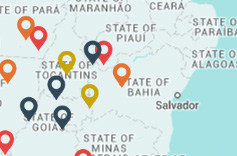Unity and Inclusion in Networks and Radio – UNIRR
The "Radio for a Just City" course – community communications on the waves and the right to housing
São Paulo
Objectives and target population:
The aim of the project is to create twenty-five community communicators of different occupations from the region of Taboão da Serra, São Paulo, so that they can use radio as a political instrument, to organize and confront social problems.
The idea is that the production of radio pieces and the widening of the debate on housing, access to public services and the right to information and communications strengthen the struggle of Homeless Workers Movement (MTST) activists.
Aside from those participating in the course, who come from the Southwest Occupation (seven occupations), from Campinas, from the ABC region of São Paulo and from Osasco, all of the families of these occupations will also benefit, as will MTST activists all over the country, who will be able to adopt the techniques learned by the participants.
The training will serve as an exchange of experiences of resistance and social organization against human rights violations, creating repeatable instruments for further training and communications for other activities and occupations.
The “Radio for a Just City” course has a curriculum based on the “Whole Communicator,” the main course in radio and citizenship offered by UNIRR, held since 1995.
Main activities:
– Meeting with the coordinators of UNIRR and MTST in Taboão to plan logistics and pedagogy;
– Opening event of the “Radio for a Just City” course, with the presence of the trainers and leaders from the MTST to present the course and teams;
– Ten workshops of eight hours each – for the classes and the production of a pilot radio program and spots. Part of the class content will include production techniques for the pieces as well as discussions on ethics, citizenship and the right to communications, and a debate on housing and social justice;
– Closing workshop and program launch, with MTST leaders.
Context:
The history of disorganized and unjust growth in large Brazilian cities has been marked by the appearance and expansion of favelas and the removal of poorer residents to the periphery of urban centers.
This policy of exclusion in Brazil has caused a housing deficit of 23 million homes, according to data from the very Construction Industry Department of the Federation of Industries of São Paulo (Deconcic/Fiesp). This housing deficit constitutes a historical social problem, largely ignored by governments. And even with the federal government having, over the last nine years, debated this issue—with programs such as “Minha Casa, Minha Vida” (My House, My Life), for example—the problem is far from solved. The injustice worsens, with the fragility of transportation services, low quality of public health care in the city outskirts, lack of leisure areas and cultural venues in neighborhoods, etc.
In this context, the organized population needs to be able to interfere and report on the urban development model designed in the country, which, in practice, incurs the cost of human rights violations. It is also fundamental that the population in general knows about the consistent and just proposals coming from an alternative model of public housing policy.
About the organization:
The Unity and Inclusion in Networks and Radio (UNIRR) is a non-governmental organization founded in 1995 whose mission is to train, assist and support those institutions and individuals that use or wish to use radio or other means of communication to promote the construction of an inclusive, democratic society.
For the last seventeen years, the UNIRR has put into practice the idea that radio training makes it possible to develop critical individuals; with verbal dexterity; open to sharing society with those of different genders, races, social classes, etc; conscious that the right to communication is a basic human right; and prepared for the challenges of a society that needs to be more just and inclusive.
Partnerships:
Member of the Worldwide Association of Community Radios (Amarc – Brasil), UNIRR is also associated with Abong – the Brazilian Association of Non-Governmental Organizations.
Funding Line
Urban Development (2012)
Year
-
Total Granted
-
Duration
-
Main Themes
The right to just and sustainable cities






